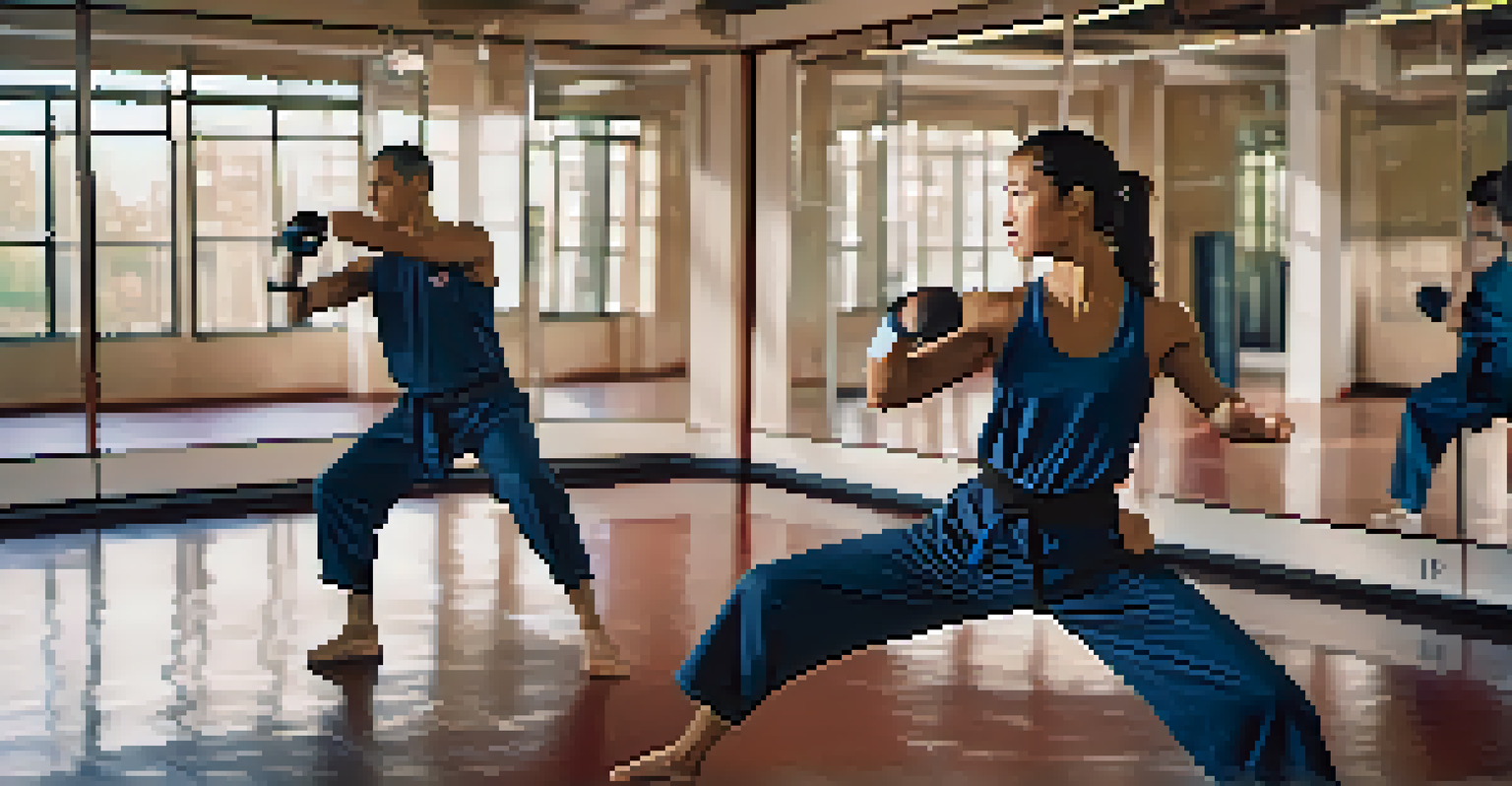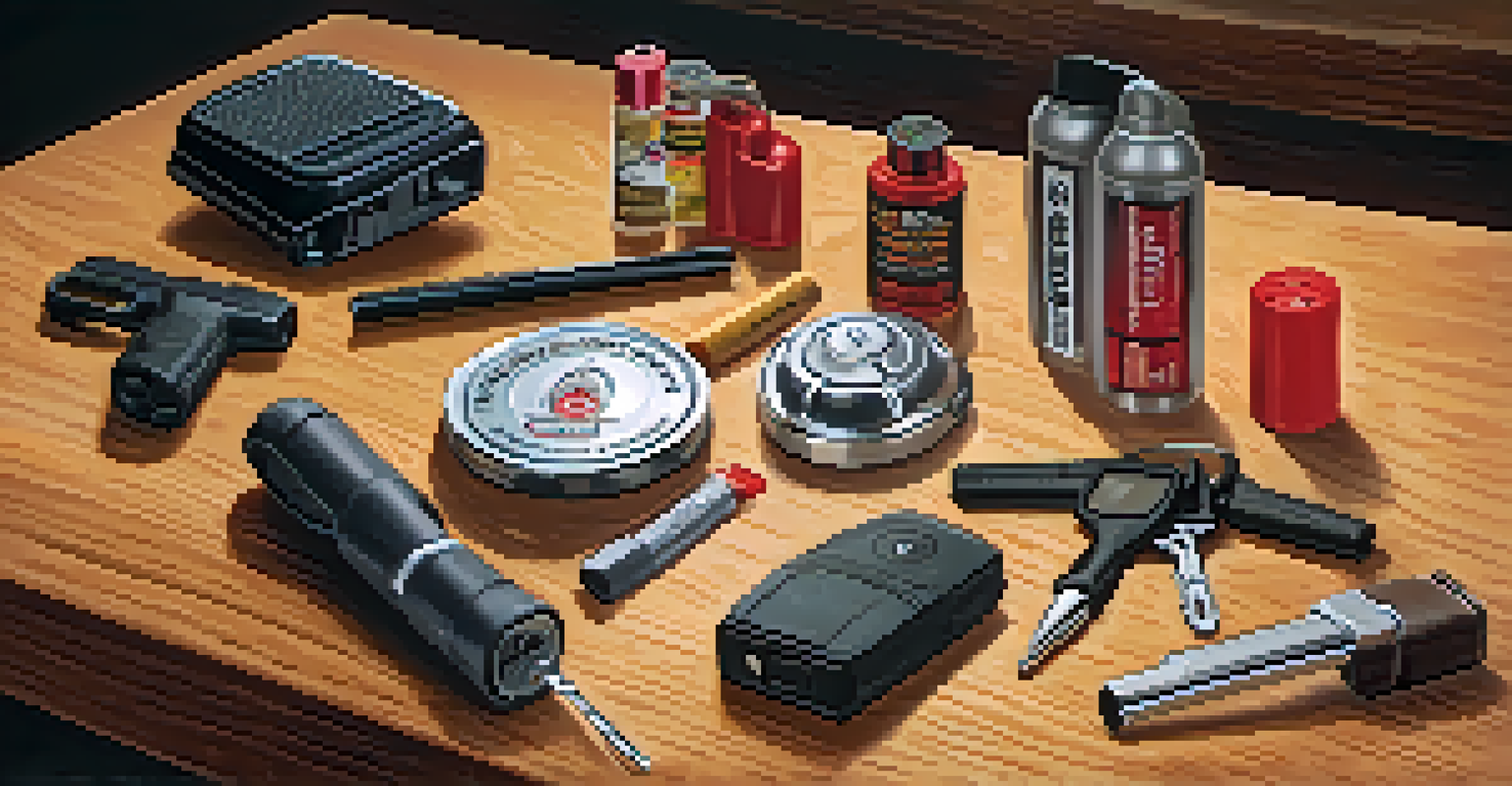Self Defense Tools: Choosing the Right Gear for Activists

Understanding the Importance of Self Defense for Activists
Activism can sometimes put individuals in challenging situations where safety becomes a concern. Understanding the importance of self-defense is crucial for activists who may find themselves in potentially dangerous environments. Whether you're participating in a peaceful protest or advocating for a cause, having the right mindset and tools can empower you.
The best defense is a good offense.
Self-defense isn't just about physical confrontation; it's about being prepared and aware of your surroundings. By equipping yourself with self-defense tools, you're taking proactive steps to ensure your safety and that of others. This readiness can foster confidence and a sense of empowerment, allowing you to focus on your cause without unnecessary fear.
Moreover, self-defense can also be a way to protect your values and the community you stand for. By prioritizing your safety, you not only protect yourself but also send a strong message about the importance of human rights and personal safety in activism.
Assessing Your Personal Safety Needs
Before selecting self-defense tools, it’s essential to assess your specific safety needs. Consider the environments you'll be in, the types of events you’ll attend, and the potential risks associated with them. This assessment will guide you in choosing gear that is not only effective but also practical for your situation.

For instance, urban protests might require different tools than rural rallies. If you'll be in a crowd, lightweight and easily concealable items might be best. Conversely, if you’re in a more controlled environment, you might opt for something more substantial that offers greater protection.
Self-Defense Empowers Activists
Understanding self-defense enhances safety and confidence for activists in potentially dangerous situations.
Additionally, evaluating your comfort level with various self-defense methods is important. Some people may prefer non-violent tools like personal alarms or pepper spray, while others may feel more secure with self-defense classes that teach physical techniques. Knowing what makes you feel safe will help you make the right choice.
Popular Self Defense Tools for Activists
There are various self-defense tools available, each serving different purposes. For instance, personal alarms can be a great choice; they emit a loud sound when activated, attracting attention and potentially deterring aggressors. These devices are easy to carry and can provide peace of mind in crowded settings.
Safety isn't expensive, it's priceless.
Pepper spray is another popular option, as it’s compact and effective for self-defense. It can incapacitate an attacker temporarily, giving you valuable time to escape. However, it’s important to check local laws regarding its use, as regulations can vary significantly from one place to another.
Other tools worth considering include tactical flashlights and self-defense keychains. Flashlights can help you navigate dark areas while also being used to momentarily blind an attacker. Meanwhile, self-defense keychains can deliver a surprising impact, offering both practicality and protection.
Legal Considerations When Choosing Self Defense Gear
Before purchasing self-defense tools, it’s vital to understand the legal landscape surrounding their use. Regulations can differ widely based on your location, and some self-defense items may be restricted or illegal. Always do your research to avoid potential legal issues that could arise from using an inappropriate tool.
For example, while pepper spray is legal in many areas, there are restrictions on its size and strength in some states. Similarly, certain weapons may require permits or carry restrictions. Knowing these laws can save you from complications during an event.
Choose Tools Based on Needs
Assessing personal safety needs helps activists select the most effective self-defense tools for their environments.
Additionally, being aware of the legal implications of using self-defense tools is crucial. If you ever have to use your gear, understanding your rights and responsibilities can help you navigate any subsequent legal processes. This knowledge empowers you to act confidently and responsibly in any situation.
Training and Familiarization with Self Defense Tools
Owning self-defense tools is only part of the equation; knowing how to use them effectively is equally important. Before heading out to an event, take time to familiarize yourself with your gear. This practice can make a significant difference in a stressful situation where every second counts.
Consider enrolling in self-defense classes or workshops that teach practical skills. These sessions often provide hands-on experience with different tools and techniques, helping you build confidence. Plus, you’ll have the opportunity to ask questions and learn from experienced instructors.
Regular practice is key to retaining skills, so find ways to incorporate training into your routine. Even simple drills at home can help you become more comfortable with your self-defense gear, ultimately enhancing your readiness and response in real-life scenarios.
Building a Community for Support and Safety
In activism, community is everything. Engaging with like-minded individuals can provide not only emotional support but also practical advice on self-defense. Sharing experiences and knowledge about personal safety can help everyone feel more empowered and prepared.
Consider forming or joining groups focused on self-defense training and safety strategies. These networks can share resources, organize workshops, and even practice scenarios together. The more you learn from one another, the better equipped you’ll all be to handle potential threats.
Community Support Enhances Safety
Building a supportive community among activists fosters shared knowledge and strategies for personal safety.
Moreover, a strong community can act as a deterrent against violence. When people stand united, there’s strength in numbers, which can discourage any aggressive behavior. Building relationships within your activist circles can foster a culture of safety and support.
Staying Informed and Adapting Your Gear
The landscape of activism and personal safety is constantly evolving, so staying informed is crucial. Keep an eye on current events, local laws, and emerging self-defense techniques. This knowledge ensures that you’re always prepared for changing circumstances.
Additionally, regularly assess whether your self-defense gear still meets your needs. As you gain more experience in activism, your safety requirements may change. It’s wise to periodically review what tools you have and consider whether they still align with your current situation.

Lastly, don't hesitate to seek advice from peers or experts in the field. Engaging in discussions about self-defense can provide new insights and recommendations, allowing you to adapt your approach and gear effectively.